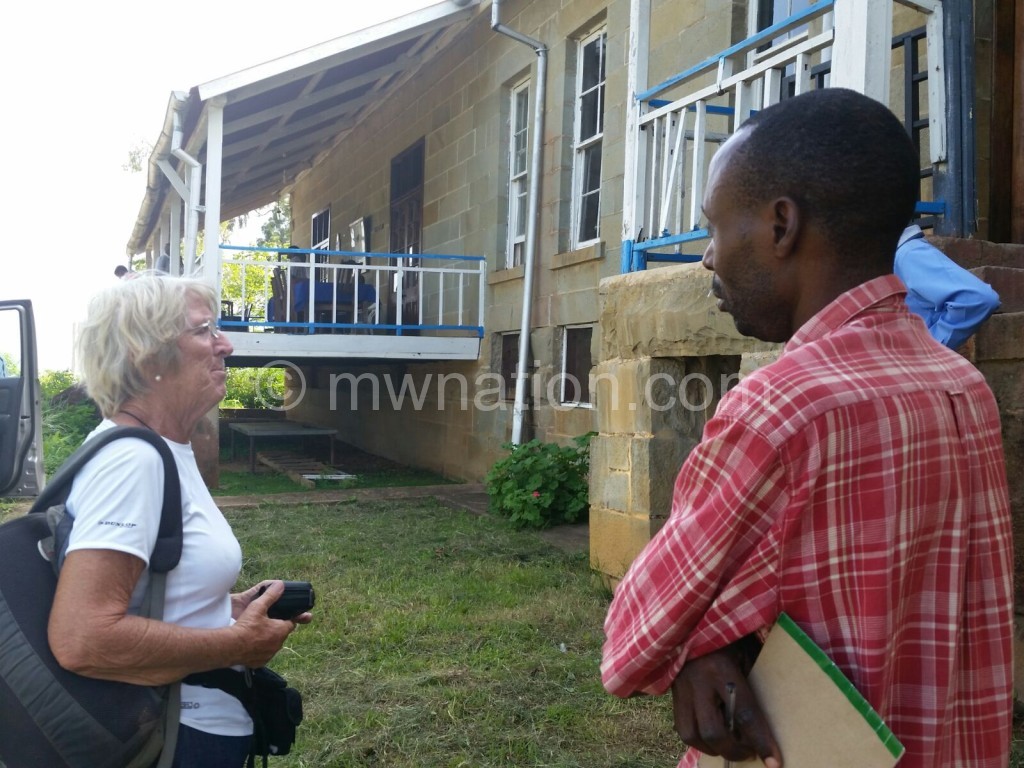Rumble up and down Golodi
Rough guides beckon tourists, but rough roads scare them away. JAMES CHAVULA writes.
When Cypriot Rosemary Papadopoulou left her country, she was partly lured by the lofty standing of Livingstonia as a top place to go while in the Warm Heart of Africa.

The pensioner had grown up saving to visit the continent, including Malawi. When the time came, she rented out her house, turned her car into a taxi, discontinued water and electricity bills and embarked on the once-in-a-lifetime adventure.
“Livingstonia is a wonderful place with lots of stunning views. I read about it in Lonely Planet. I was in Tanzania when I missed a boat to Comoros and decided to come to this spectacular spot,” the tourist said.
In 2014, the CNN travel magazine that enthused her ranked Malawi number five in its World’s Top Places To Go.
To them, it is “a place of peace and quiet”. That is what Livingstonia is. The lonely mountain-top mission station built by early Scottish missionary Dr Robert Laws in 1894 evokes no fewer superlatives.
Save for extraordinary mountain and lake views, there is more sightseeing to do than just staying at the Stone House, a museum where Laws and his local disciple Uriah Chirwa once stayed.
“Being here is a magical, peaceful and fulfilling leg in my journey. I don’t regret missing a boat,” Papadopoulou said.
A stint at Livingstonia easily draws superlatives from adventurers. But getting there conjures up fear of a bumpy, narrow road with 17 hairpin bends.
An attendant at the iconic stone house talked about a good turnout of tourists, saying it would have been bigger and better if the mountaintop setting had a better road.
They call the winding, rugged road Golodi, one of the oldest on the soil. Motorists take up to two hours to surmount the 15km accident-prone rocky way opened in 1906.
Named after David Gordon, who constructed the road, it is a sheer rumble in the jungle.
“The ride offers captivating views of the hilly terrain falling into the glistening lake, but the road is rough and very dangerous,” the Cypriot sighed.
Not many cars go there. Just a few four-by-fours and daredevils.
Papadopoulou reportedly waited for almost two hours at Chitimba Bus Stop.
“It was no big deal,” she said. “Some University of Livingstonia students had been waiting since morning.”
The learners took a congested school bus, but the boat fanatic from Cyprus could only hazard an overloaded lorry.
“I was squeezed in a corner, bags kept falling and the bumps left the passengers flying from left to right all the way up the hill,” she said.
Such cries blight the travel to the hilly spot where the early missionaries of the United Free Church of Scotland—now Livingstonia Synod of the Church of Central African Presbyterian—settled after two failed attempts at establishing a mission station at Bandawe in Nkhata Bay and Cape Maclear in Mangochi.
It is chilly. It is nearly 900 metres above the sea level. It is a no-go zone for most harmful insects, with no sights and whines of mosquitoes. The pioneer missionaries settled here partly in escape from malaria, a mosquito- transmitted disease which killed most of them before Laws opted to occupy the lonely plateau.
Called Livingstonia after Scottish missionary explorer Dr David Livingstone, the picturesque plateau, formerly Kondowe Village, deserves a good road if the country is seriously pursuing its dream to transform the emerging tourism sector as part of the country’s economic rise.
But it appears the setting, which offers fascinating flashbacks of the country’s colonial past, will not get the desired boost soon.
Former member of Parliament Ian BomaMkandawire blames politicians for the poor state of the road.
“Every president promises to improve the road, but we have sung this song for years and people are fed up with lies.”
The latter perfectly sums up the doubts and frustrations of the underserved Malawians.
Tourists, including Papadopoulou, find the road unimaginable and unthinkable for a country which demands visas worth up to $79 from tourists who spend all their lives saving to go places.
She wondered: “With all that money and dangerous roads, what would stop tourists from going to better destinations in Tanzania, Mozambique, Zambia, Zimbabwe and Kenya?”





